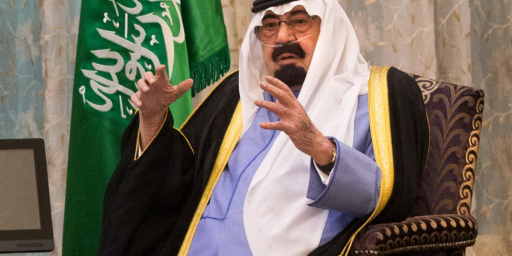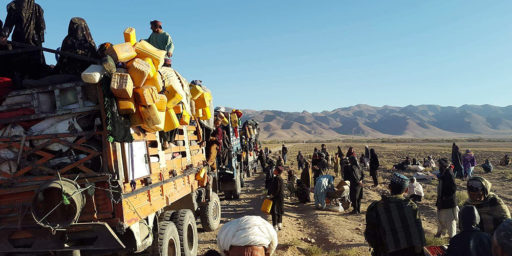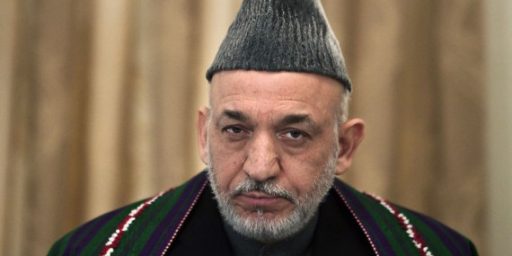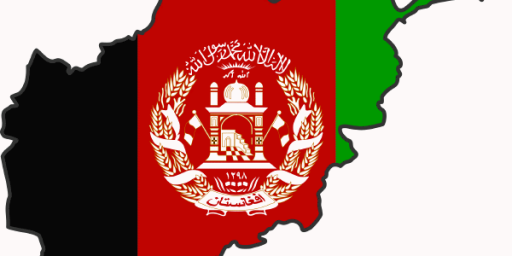What’s Next in Afghanistan?
President Karzai narrowly won a clearly fraudulent election. His main challenger, Abdullah Abdullah, has withdrawn from consideration as a candidate, ruling out a run-off election. That leaves us with an Afghan government of little or no legitimacy, unworthy of our confidence or that of the Afghan people. Classical counter-insurgency strategy requires a government with the support of the people. We don’t have such an ally in Afghanistan.
What next? The Los Angeles Times editors put in their two cents:
The status quo cannot continue. Obama has yet to decide whether he will heed the call of the U.S. commander in Afghanistan, Gen. Stanley A. McChrystal, for up to 40,000 more troops, but he has said he will not walk away from the country altogether. If that’s the case, it seems Obama has no choice but to hold his nose and press on with a weakened ally. Given that, he must push for a national unity government in Kabul to broaden its base of support and, at the same time, help develop a more decentralized administration of a land that has always been a loose collection of tribes and districts. Decentralization would allow the West to spread its resources to regional leaders rather than concentrating them in the hands of Karzai and his clique. Any U.S. strategy for stabilizing Afghanistan and drawing support away from the Taliban depends on a political leadership perceived as legitimate and a government that serves its people.
The editors of the Christian Science Monitor offer a similar prescription with a little more flesh on the bones, proposing five ways for us to move forward:
1. Strongly encourage him [i.e. Karzai] to form a new “unity government” that includes Mr. Abdullah, who on Sunday graciously removed himself from the runoff race. Karzai needs a government with wider appeal and greater credibility if he is to effectively influence the entire country.
Abdullah, who was formerly Karzai’s foreign minister, contributes on both of those counts. He ran the race (and quit it) on an anticorruption message. He hails from the Northern Alliance that helped topple the Taliban (Karzai comes from the dominant southern Pashtun ethnic group).
2. Apply quiet behind-the-scenes pressure on Karzai. The tough-love public criticism of Karzai has worked mostly to ostracise the Afghan president. Sen. John Kerry’s more subdued, but still firm, weekend of persuasion last month produced the desired effect — Karzai’s agreement to a runoff.
3. Washington should move quickly to influence selection of the Kabul government’s new cabinet. Certainly America’s contribution of troops and treasure gives it that right.
Karzai will be tempted to reward friends with high-profile posts, but what matters is competency in governance, especially in three key jobs: defense, interior, and finance. The US has successfully urged competency before — for instance, in backing the current finance minister (and prime minister) of the Palestinian Authority, Salam Fayyad.
4. Shift aid and relationships to local and regional leaders. This point counts as much as the first three combined — probably more. Insurgents do their courting outside Kabul, and the US should, too.
For 1,000 years Afghanistan has been ruled with tribal, decentralized government. Experts suggest a constitutional change that takes some powers from the president and gives them to the parliament (one idea even considers the Swiss model of semi-sovereign cantons).
But the US shouldn’t wait for such a formal change. If insurgents are to be won over (or bought), if aid is to be turned into roads and schools, if trust and a justice system are to be regained — that must happen at the local and regional level. This strategy has the added benefit of a certain independence from Karzai — but it has to be managed carefully so as not to openly insult him.
5. Finally, the US and its allies need to provide the resources and commitment to support good governance and security at the national, provincial, and local levels. For instance, it does no good to train police if the Taliban lures them away with many more times the pay. And once Afghan security forces have been trained, they need their foreign “teachers” to follow up with them on patrol. That’s a people-intensive effort.
While I think that many Americans are tired of the war in Afghanistan and skeptical both of the support of our NATO allies and the confidence of the Obama Administration in the effort, I also think that withdrawing from Afghanistan presents tactical, strategic, legal, and moral problems. I would rather that we had never invaded Afghanistan. I would rather that we would have completed our objectives there by now. However, having invaded and not achieved our objectives I think that we need to find a set of objectives and a strategy for which the American people will at least tolerate a continuing involvement with the country.
If, alternatively, the Obama Administration is insistent on pursuing the old objectives and the stated strategy, it should be fully resourced and engaged in with confidence. It certainly won’t be a classic counter-insurgency strategy.






I disagree. President Karzai was going to win anyway. This has more to do with the weak national institutions in Afghanistan. But I also think its under appreciated that the low-voter turnout in the Pashtun regions, underrepresented Karzai’s support.
I think this issue needs to be considered within the framework of Afghan culture, which is largely tribal, and prone to see legitimacy as bestowed on those who are are able to seek out and obtain the support of the largest group of leaders.
Maybe I was watching a different election unfold, but both papers complain that Karzai has failed to broaden his support and needs to form a unity government. The election was preceded by weeks of stories about Karzai reaching out to warlords and powerbrokers of dubious humanitarian credentials. Ashraf Ghani has said that the nature of the alliance put together by Karzai was so powerful that it was statistically impossible for him to lose. Karzai is a Pashtun whose built bridges to non-Pashtun powerbrokers. A former Northern Aliance leader is not going to help broaden the government’s base of support in the Pashtun regions, where voting was largely absent.
As I see it, the problem of Afghanistan is that it’s a weak state, regardless of who is running it. It’s weak because of geography, economy and culture (in that order). I see three or four choices:
1. Strengthen the state.
2. Strengthen the Afghan military.
3. Strengthen Pashtun anti-Taliban leaders.
4. Operate as a law unto ourselves.
Can anyone point to a time when Afghanistan had a government with the support of the people (and not just one faction)? The closest I can come is Alexander the great and that lasted as long as he and his army was there.
I would suspect that Karzai can lay claim to a larger percentage of the people than most if not any other Afghan leader since A the G. If so, what we have may be the best that can be achieved at this point. That best may still not be good enough for some options, but that is a different issue.